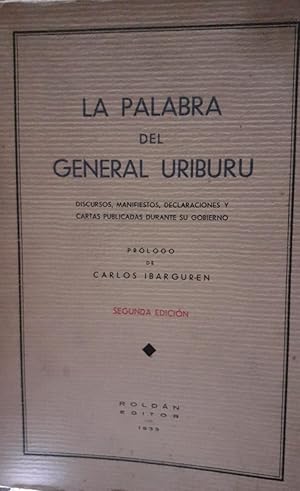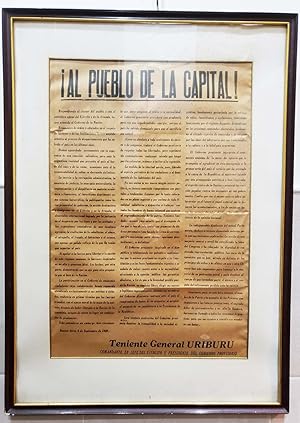GENERAL URIBURU (3 risultati)
Tipo di articolo
- Tutti gli articoli
- Libri (3)
- Riviste e Giornali
- Fumetti
- Spartiti
- Arte, Stampe e Poster
- Fotografie
- Mappe
-
Manoscritti e
Collezionismo cartaceo
Condizioni
Legatura
- Tutte
- Rilegato
- Brossura (2)
Ulteriori caratteristiche
- Prima edizione
- Copia autografata
- Sovraccoperta
- Con foto (2)
- No print on demand
Paese del venditore
Valutazione venditore
-
La palabra del General Uriburu
Editore: Roldan, editor, 1933
Da: DEL SUBURBIO LIBROS- VENTA PARTICULAR, C.AB.A, CAP, Argentina
Membro dell'associazione: ALADA
Libro
Encuadernación de tapa blanda. Condizione: Muy bien. 2ª Edición. La palabra del General Uriburu. Discursos, manifiestos, declaraciones y cartas publicadas durante su gobierno. Prólogo de Carlos Ibarguren 1933 175 pp Historia argentina De Editor Castellano COL 2 D 1.
-
Tapa Blanda. Condizione: New. FOTOS: No dude en pedir mas fotos. Ejemplar Nuevo.
-
Al pueblo de la Capital!
Data di pubblicazione: 1930
Da: Chaco 4ever Books, Montevideo, MO, Uruguay
Libro
Sin Encuadernar. Condizione: Muy bien. Folio. One sheet of 37 x 56 cm. Framed contemporaneously. On September 6, 1930, a period marked by the irruption of authoritarianism began in Argentina. The coup d'état that overthrows President Hipólito Yrigoyen inaugurates in Argentine history a period of permanent irruptions to democratic continuity. This coup meant the return to the old practices of electoral fraud, corruption and negotiated. For this reason, this period of Argentine history is known as the " Decada infame " Infamous Decade. A growing disbelief in democracy and its institutions is observed in the population. As in Europe, certain political sectors and the Armed Forces viewed the democratic system with distrust because they believed that it would not be able to contain society and maintain order. The succession of civilian and military governments (beginning in 1930) led to a complex path in the development of national history of Argentina. The confrontations, the divisions and the tensions happened to be current in the handling of the Argentine policy. After the coup of 1930, Uriburu did not manage to govern two full years. The period was difficult, since Argentina suffered the consequences of the economic crisis of the United States (1929). On the other hand, Uriburu wanted to carry out a "corporate" project that included the reform of the National Constitution. These aspirations did not have good reception and Uriburu was losing support. This situation led him to seek an electoral solution that would allow him to withdraw from the presidency. The Concordance (union of various sectors as conservatives, independent socialists, radical dissidents, among others) won in the elections of 1931. This "triumph" was achieved through the practice of electoral fraud (the popular will would not be respected) . This practice was called patriotic fraud. In this way, it was guaranteed that governments would not fall into the hands of the "radical mob". The newly elected Agustín P. Justo (President) and Julio A. Roca (Vice President) represented the interests of the conservative sectors and allowed the return to power of the groups that had controlled it before 1916. The government took important measures, especially in the economic area, such as the signing of the Roca Runciman pact. On the other hand, the role of the State is transformed and it becomes much more active and comptroller. Facing the crisis, the government tries to make the State become a tool that allows the regulation of the economy.




